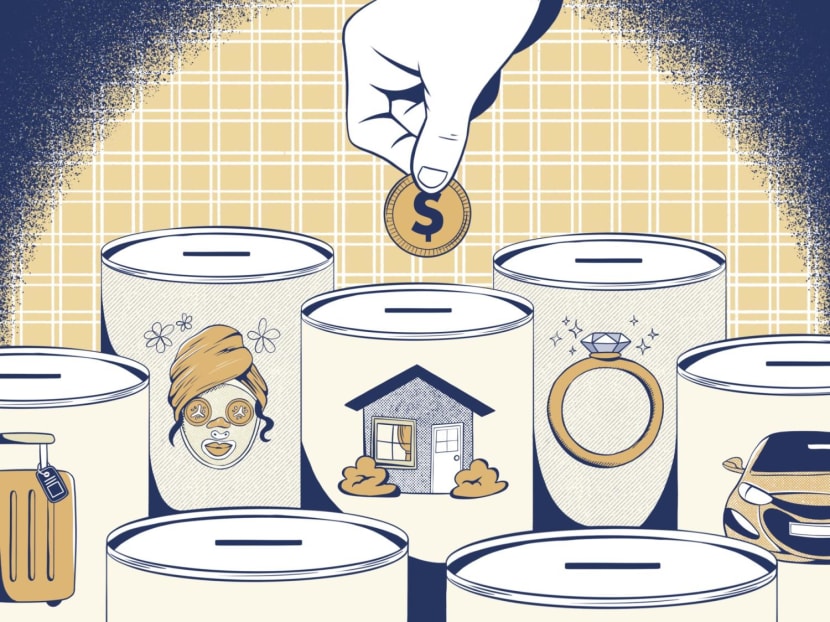Adulting 101: How do I balance the need to save money for life’s key goals with the urge to ‘treat myself’?

The writer examines the financial tension between practising self-care by treating themselves and setting aside money for some of life's main objectives such as buying a home.
SINGAPORE — After long, particularly stressful weeks at work, I tend to reward myself for getting through them by spending money in the name of self-care.
A soothing shoulder massage, a hearty expensive restaurant meal, a preposterous S$50 peak-hour taxi ride on a Friday night.
As the knots on my back are skilfully kneaded away, as I gobble up overpriced but delightful plates of sashimi, a simple thought floats to the surface: “I deserve this.”
However, that thought, while quite compelling in the moment, is almost always followed by a harsher, more pragmatic one that makes me feel guilty and somewhat anxious.
“I should definitely be saving more.”
Increasingly, societal discourse places an emphasis on prioritising one’s own mental health and well-being, and we're left feeling that we owe it to ourselves to feel good in the present.
Yet, two years shy of turning 30, my financial commitments have been steadily stacking up and the list of things I soon have to fork out considerable sums for include: A down payment for my new three-room flat, renovation and all the costs that come with holding a wedding.
Are my “self-care” spending habits fundamentally irresponsible? Is there a way to balance the need to save money for life’s important things when the urge to "treat myself" is frequently there?
FINANCE-RELATED ANXIETY ‘COMMON’
Ms Jeanice Cheong, a clinical psychologist at Heartscape Psychology, said that the rising cost of living can cause money-related distress, which is common for people living in modern societies such as Singapore.
“In light of increased exposure to social media, there has been increased pressure on individuals to live up to social expectations or norms regarding spending or saving patterns," she noted.
“These can add on to stress they already experience regarding money and finance.”
A recent study by global health firm Cigna Healthcare indicated that almost nine in 10 Singaporeans reported feeling stressed last year, with 16 per cent saying they felt that the stress was "not manageable".
It’s therefore not surprising that trends such as “doom-spending” have surfaced recently, which refers to spending large sums on things that offer immediate fulfilment, as opposed to choosing to save.
However, such reckless spending can make matters worse.
Dr Oliver Suendermann, vice-president (clinical) of mental healthcare firm Intellect, said that we live in a “hyper capitalist society that encourages, incentivises and manipulates us into overspending”.
This comes with huge problems in the long term because debt is a strong predictor for depression, he cautioned.
Ms Cheong said: “If self-care activities that are meant to support one’s well-being start to trigger unfavourable feelings, this can be considered counterproductive and unhelpful to overall well-being.”
DEFINE ‘SELF-CARE’ FIRST, THEN SET A BUDGET
Does this mean that I should be ditching all my self-care spending habits?
Not quite. Dr Suendermann offered one way to tackle this feeling of guilt: Prioritise purchases by aligning them with our values and goals.
That’s why we should first define what self-care means to us, and reflect on whether we would be happier spending money on something now or saving it for something with more long-term value in the future.
Mr Raymond Ong, chief executive officer of Etiqa Insurance Singapore, said: “Indulging in self-care should be about quality, not quantity.
“It can be more fulfilling to occasionally treat yourself to something truly meaningful rather than frequent, less significant activities or programmes.”
This, to me, means weighing whether I’d be okay with eating economical rice sets more often in order to be better placed to buy nicer furniture for my future home.
On this score, mental health and finance experts are unanimous: Set a budget each month for your self-care needs — then stick to it.
Mr Clarence Cheong, a senior group financial services director at Infinity Financial Advisory, said that one should begin by creating a financial plan that draws out how much you need to save for long-term goals such as the home or wedding expenses.
After that, set a specific monthly budget for self-care expenses, allowing yourself to enjoy them guilt-free within those limits.
“Having clarity can help alleviate overall spending anxiety and provide a clearer perspective on your financial situation,” Mr Cheong said.
Ms Cheong of Heartscape Psychology agreed: “This can provide you with a sense of expectation and certainty, which potentially makes this endeavour less stressful.”
If sticking to your budget feels challenging, Dr Suendermann suggested finding an accountability partner to work through money matters together.
“It's that bit about having to answer someone that can get you to stick to a goal.”
SELF-CARE NEED NOT BE EXPENSIVE
It is also important to recognise that self-care need not always mean digging deep into the wallet, Mr Ong of Etiqa Insurance said.
“For instance, taking a walk in nature, practising meditation, or spending quality time with loved ones can be profoundly rejuvenating without affecting your financial standing,” he added.
“However, when it does involve some spending, the key is to include it in your overall budget.”
Another way to reap benefits from our spending can be to prioritise self-care activities that contribute both to mental well-being and practical needs, Mr Cheong of Infinity Financial Advisory said.
“For example, investing in quality skincare products may serve both relaxation and health purposes. Decide what you can forgo and what you cannot.”
Ultimately, we have to be compassionate to ourselves, even if we sometimes fall short of our own expectations,Ms Cheong of Heartscape Psychology said.
“Should there be lapses — spending more than stipulated, for example — treat yourself with compassion. This can increase your motivation to keep to a longer-term financial goal than if you were to engage in self-criticism,” she advised.
Upon reflection, I don’t think my intentions in “treating myself” were misguided, even if they did cost me a portion of my savings each month.
What I lacked was a plan that can be put into practice, in the form of a budget, and perhaps some double takes on whether the price of certain purchases really offer value for money in terms of happiness and well-being.
I think I should treat myself to a long sit-down to draw up just such a budget.








